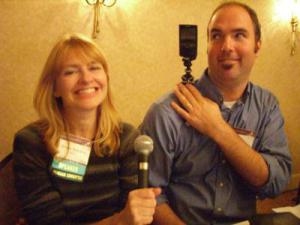Science writers aren’t just learning to write anymore; in these digital times they want to learn about Web video.
Confession: I stole that lead. It’s the opening narration for a short video produced and directed by volunteers who attended the NASW workshop “Producing video, on camera and off.” Instructors Christie Nicholson, freelancer and online contributor at Scientific American; and Eric R. Olson, audio-video editor at the Nature Publishing Group; walked us through the process of composing and shooting several quick interviews. Then they showed us how to organize the shots and add narration. “It’s not rocket science,” Nicholson reassured us.
Olson passed around a surprisingly small equipment kit, used for making Web videos at Scientific American, which contained a Kodak camera and microphone. (A Flip camera is an alternative to the Kodak model.) The other two essentials: a tripod and editing software such as Final Cut Pro or iMovie. Price for everything: only about $200.
We looked at some examples of videos that worked well, such as Carl Zimmer’s cuttlefish-bites-man story. The most important elements of a good video story, the instructors explained, are action and engaging characters.
So where is the amazingly cool video that my classmates and I produced? Unfortunately, there wasn’t time for the other two crash courses we need to become full-fledged video producer/directors: doing an actual shoot of a real event, and editing our material in post-production, but those would make great sessions for ScienceWriters 2011.




